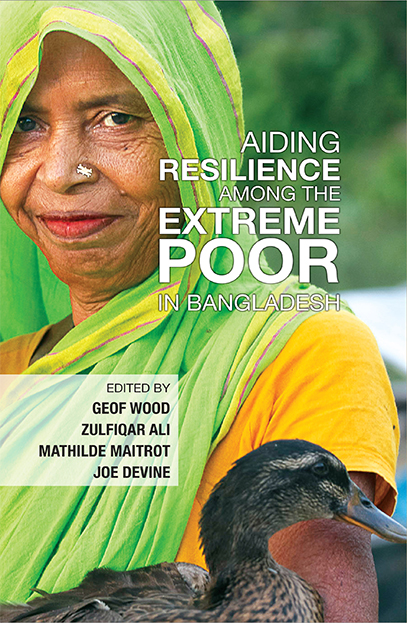- Shop
- Development
- Aiding Resilience Among the Extreme Poor in Bangladesh
Aiding Resilience Among the Extreme Poor in Bangladesh
https://uplbooks.com/shop/9789845062404-aiding-resilience-among-the-extreme-poor-in-bangladesh-12102 https://uplbooks.com/web/image/product.template/12102/image_1920?unique=b656810
| Language: English |
Tags :
Book Info
This book comprises a selection of studies from the research team of the Extreme Poverty programme (EEP-Shiree), sponsored by GOB-DFID during 2008-16. Its core premise is that extreme poverty is significantly different as a socio-economic, political and cultural experience from being moderately poor in the society. This categorical distinction is centred around the principle of social isolation and exclusion from supportive networks of kin and social capital within communities, often reinforced by the prominence of female-headed or managed extremely poor households. In many instances, they are too poor and without the capabilities to be attractive to others for the purposes of exploitation! The place of exploitative relationships in the reproduction of extreme poverty is thus an empirical question: is their condition more idiosyncratic than systemic? However, the categorical distinction between extreme and moderate poverty should not be overstated. Among the poor of any category, there is a churning of fortunes, moving up and down across externally established, monetized poverty lines, meaning that snapshot targeting has to be replaced by dynamic, more community-level targeting approaches. The purpose of any targeting is to focus both productive assets and cash transfers upon those in need, but under conditions of inequality and poor governance can any gains be protected and sustained? The papers in this volume explore the experience of supporting the livelihoods of the extremely poor from these perspectives and draw attention to policy and practice being driven by the goal of resilience rather than just graduation from being extremely poor.

Geoffrey Wood
Geof Wood is an Emeritus Professor of International Development at the University of Bath, UK. He was the Founder Director of the Institute for International Policy Analysis; Head of Department of Economics and International Development; Dean of Faculty of Humanities and Social Sciences; University Research Adviser, ex-Chair of Board of INTRAC, Oxford, and ex-President of the UK Development Studies Association. Dr.Wood arrived in Bangladesh in 1974. Since then, he conducted ethnographic and inter-disciplinary research on aspects of agrarian change, poverty, governance, and civil society in Bangladesh and Pakistan, and elsewhere, examining theories of insecurity, Faustian bargains, access, welfare regimes, strategies of de-clientelisation, extreme poverty and resilience, and de-peasantisation. He promotes the understanding of political economy via analysis of deep structures.





